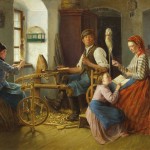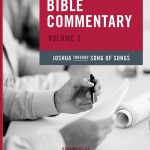By Theology of Work Project
A remarkable connection between the book of Proverbs and the world of work occurs at the end of the book. Lady Wisdom, who we meet at the beginning of the book (Prov. 1:20-33, 8:1-9:12), reappears in street clothes in the final 22 verses of the book (Prov.31:10-31) as a living, breathing woman, termed “the virtuous woman” (KJV). She finds fulfillment in her family and ensures that “her husband is known in the city gates, taking his seat among the elders of the land” (Prov. 31:23). But the text focuses on the woman’s work as an entrepreneur with a cottage industry and its servants to manage (Prov. 31:15). Proverbs 31:10-31 does not merely apply to the workplace; it takes place in a workplace.
The book of Proverbs is summarized, then, in a poem praising a woman who is the wise manager of diverse enterprises ranging from weaving to wine making to trade in the market. Translators variously use the words “virtuous” (KJV), “capable” (NRSV), “excellent” (NASB), or “of noble character” (NIV) to describe this woman’s character in Prov. 31:10. But all these terms fail to capture the element of strength or might present in the underlying Hebrew word (chayil). When applied to a man, this same term is often translated “strength,” as in Prov. 31:3. In a great majority of its 246 appearances in the Old Testament, it applies to fighting men (e.g., David’s “mighty warriors,” 1 Chronicles 7:2).
Translators tend to downplay the element of strength when the word is applied to a woman, as with Ruth, whom English translations describe as “noble” (NIV, TNIV), “virtuous” (NRSV, KJV) or “excellent” (NASB). But the word is actually the same, whether applied to men or women. In describing the woman of Proverbs 31:10-31, its meaning is best understood as strong or valiant, as further indicated by Prov. 31:17, “She girds herself with strength, and makes her arms strong.”
To some people in the ancient near east, and even to some now, portraying a woman as a model of wise entrepreneurship would be surprising. Despite the fact that God gave the gift of work to men and women equally (Genesis 1 and 2), women’s work has often been denigrated and treated with less dignity than men’s.
But this concluding passage of Proverbs characterizes the Valiant Woman as a wise worker in five sets of practices in her workplace: trustworthiness, diligence, shrewdness or prudence, generosity, and justice. The five sets of practices observed in the Valiant Woman serve as a framework for exploring the entire book of Proverbs. She functions in the book as an affirmation of the dignity of every person’s work.
As always in the book of Proverbs, the way of wisdom flows out of the fear of the Lord. After all the Valiant Woman’s abilities and virtues are described and honored, the source of her wisdom is revealed. “A woman who fears the Lord is to be praised” (Prov. 31:30).
Adapted from Theology of Work Project. Image: “Interior with Artisan Family,” August Mansfeld. Courtesy of the Grohmann Museum.












